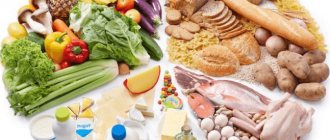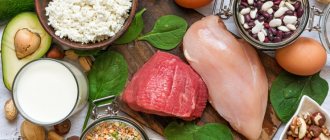The article will teach you how to eat throughout pregnancy. You will also learn what foods you should exclude from your diet.
Pregnancy is the most wonderful time in the life of every woman. During this period, representatives of the fair sex are surrounded with care, attention and love. Both the woman herself and the people around her await the birth of a new person with great joy. But in order for the baby to be born healthy, the mother must constantly monitor her diet.
After all, if her body does not receive the required amount of vitamins and microelements, then not only she, but also her baby will suffer. A balanced and proper diet will help you endure pregnancy without unnecessary stress, and will also have a positive effect on the development of the baby.
Nutrition in the first trimester
In the first three months of pregnancy, all the internal organs and systems of the baby’s body are formed, so it is very important that both he and the mother receive the right amount of nutrients. But under no circumstances listen to grandmothers and start eating for two. So, you will simply overload the gastrointestinal tract, and thereby add unnecessary problems to yourself.
Eat only when you feel like it, and whenever possible, eat freshly prepared food. If you do not want to harm your future son or daughter, then, in general, give up chips, crackers, sweets, soda, fast food, processed foods, smoked, peppered and salty foods.
Nutrition rules:
• Number of meals. It will be better if you eat 5-6 times a day, in small portions. In order for the body to rest at night, take your last meal at least two hours before bed • Food processing. It will be better if you try to minimize your consumption of fried foods. Steam or bake food in the oven • Liquid. For normal functioning of internal organs, a pregnant woman needs to drink 1.5-2 liters of clean water per day. If your body is very swollen, it is better to consult a doctor and he will help you figure out whether you can drink so much liquid • Vitamins. From the first days of pregnancy, train yourself to eat as many vegetables and fruits as possible. The fiber they contain will help cleanse the body, and the nutrients will maintain its tone.
Normal weight gain during pregnancy
Work towards gaining weight gradually during pregnancy, with the greatest gains towards the end of pregnancy. For a woman with a healthy BMI (18.5-24.9), it is normal to gain about 1-1.5 kg during the first trimester, and then 1.5-2 kg each month during the second and third trimesters. Ideally, during your entire pregnancy you should gain between 11.5 kg and 16 kg. During the last six months, you should consume an additional 300 calories per pregnancy per day, but these should come only from healthy foods. That is, carbohydrates such as those found in candies, sweet drinks and desserts are not suitable for this.
Nutrition in the second trimester
In the second trimester, the child develops even more intensively than in the first, so his body begins to require even more nutrients. In addition, the mother herself needs more vitamins, because the placenta in which the baby is located takes quite a lot of microelements from the body. And if a woman does not replenish them in the required quantity, then it is likely that she will develop hypovitaminosis and decrease hemoglobin.
Nutrition for a pregnant woman in the second trimester: • Try to eat steamed fish at least every other day. For variety, make seasonal salads with fresh or baked vegetables. • Be sure to take vitamin complexes and folic acid • Buy exclusively low-fat cottage cheese, milk and kefir • Replace regular bread with a product made from wholemeal flour • Do not eat more than 10-15 g of salt per day • Prevent anemia. To do this, include various nuts and buckwheat in your diet • If you want your placenta to always be normal, do not forget to drink rosehip decoction
Nutrition during pregnancy: do's and don'ts
Nutrition during pregnancy: myths and reality
Proper nutrition during pregnancy is very important, because the child receives all the substances necessary for growth and development from the mother’s blood.
However, pregnant girls are often concerned about the question of how to lose weight after childbirth, because the kilograms gained over nine months seem like an unbearable burden that cannot be gotten rid of. But don’t worry, because many people manage to get into shape very quickly and easily return to their “pre-pregnancy” sizes. And some (and there are many of them), after giving birth, weigh even less than before pregnancy! It is much easier to achieve this result if you eat right during pregnancy.
They say that an expectant mother needs to “eat for two,” but this opinion has long been outdated. The need for calories increases only in the last months of pregnancy, and even then not by much - by about 200 calories per day.
But going on a diet before childbirth is also not recommended, as this can pose a danger to the body of the mother and child. The most important rule of nutrition during pregnancy is that foods and methods of preparing them should be healthy!
You've probably heard that women's taste preferences during this period can be very unusual: some really want chocolate, while others want hamburgers. Sometimes you can treat yourself to these “forbidden” products, but you shouldn’t get carried away - they have no benefit for either the child or the mother. And in this case we are talking not only about the figure. Overeating often leads to weight gain, and this, in turn, is fraught with other consequences, for example, toxicosis, edema, poor health and difficult childbirth.
A pregnant woman's weight begins to increase from 4–5 months of pregnancy. From this period, an increase of 350–400 grams per week is considered normal.
Of course, cases are different - some girls gain 4 kg in nine months, and some even 20, but gynecologists and nutritionists agree that the total gain during the entire pregnancy should be 7-16 kilograms. Don’t be alarmed, they are all distributed in the right way, and the mother’s excess weight is only a small part of the increase and, as a rule, goes away easily within a month or two after giving birth.
Nutrition during pregnancy: healthy foods
During pregnancy, both mother and baby need vitamins in large quantities. That is why include as many vegetables and fruits as possible in your diet - fresh, steamed or stewed. These cooking methods will help preserve maximum nutrients in foods.
Particular attention should be paid to vegetables and fruits that contain vitamin C, for example, citrus fruits, bell peppers, black currants, rose hips, cherries, etc.
Vitamin E is no less important for the body of a pregnant woman - it is found in vegetable oil, wheat germ, soybeans, broccoli, Brussels sprouts, leafy greens, spinach, whole grain bread and eggs. Foods enriched with protein, such as meat, fish, eggs and dairy products, are very useful - they should be eaten regularly! During pregnancy, girls' hemoglobin always decreases. This is due to the fact that the child takes a large amount of iron from the mother’s body, and this can lead to anemia and other serious consequences.
Therefore, when planning your diet during pregnancy, pay attention to foods such as kiwi, buckwheat, apples, spinach, beets and pomegranate juice - they contain a large amount of iron. Zinc is another very important element for the body. It strengthens the immune system and also promotes the process of blood production in the mother’s body. Most zinc is found in cheese, seafood, meat, legumes and nuts.
Since the mother has to share the beneficial substances obtained from food with the baby, doctors always recommend that pregnant women drink special vitamins.
Don't forget about fluids: in the beginning and middle of pregnancy you need to drink a lot - at least one and a half liters a day, but in recent months you need to be careful with drinks to avoid swelling.
Nutrition during pregnancy: dangerous and prohibited foods
The gastronomic preferences of pregnant women can be surprising. It is believed that nutrition during pregnancy often depends on the gender of the unborn child - mothers of boys often want fatty fried meat and beer, and those who are expecting girls simply cannot do without sweets.
Of course, you cannot deny the expectant mother what she wants, but you yourself should know when to stop and monitor the quantity and quality of your nutrition during pregnancy. If you have a sweet tooth, try to choose healthy sweets - dark chocolate, marshmallows, marmalade.
When preparing dishes, be careful with salt and spices - during pregnancy, spicy and salty foods should be greatly limited! Try to use an oven and steamer instead of a frying pan and oil. It is better to completely exclude foods such as sausage, canned food, fast food, chips, soda and sushi from the diet during pregnancy.
In the second half of pregnancy, you need to be very careful with foods that can cause allergies: strawberries, tomatoes, chocolate, etc.
Photo: Shutterstock
Nutrition in the third trimester
In the seventh month of pregnancy, a woman's body changes a lot. It becomes larger and clumsier. But unfortunately, not only the appearance changes, but the entire body as a whole. Due to the fact that the uterus by this time increases quite significantly in size, it begins to compress the internal organs.
Against the background of these changes, the stomach, kidneys and bladder begin to malfunction, and some women experience severe heartburn. Some food restrictions will help to avoid such problems.
Recommendations: • Reduce the amount of liquid you drink • Eat large quantities of vegetable soups and milk porridges • Prepare food exclusively with vegetable oils • Start taking iodine-containing medications • Once a week we arrange a fasting day for ourselves • At the end of the eighth month we begin to gradually reduce the consumption of sugar and honey
Nutrition in late pregnancy
In the later stages, the body is very depleted, so a pregnant woman’s diet must be properly balanced. It should contain as many different, high-quality and healthy foods as possible. Therefore, eat even those foods that were not very often present in your diet before.
Most women gain extra pounds towards the end of pregnancy. This upsets them very much, and they begin to limit themselves in food. But going on weight loss diets while pregnant is strictly prohibited. Diet is stressful for the body, and during pregnancy its negative impact can increase several times. Therefore, it is better to wait until the baby is born and only then start working on your figure.
Tips to help you eat properly in late pregnancy: • To reduce swelling, drink rosehip decoction or diluted beet juice • Increase your fat intake • Try to chew your food thoroughly • Eat as much cottage cheese as possible • Eliminate brewed coffee and strong tea from your diet
Useful video about what foods to choose during pregnancy
List of sources:
- Tatiana Butskaya. Eat for two! All about nutrition for pregnant women // AST Publishing House LLC, 2020 -288 p.
- Brown J. Nutrition and pregnancy: All about nutrition before conception, during pregnancy and after childbirth / J. Brown. - M.: Fair-Press, 2001. - 229 p.
- Yurkov A.S. Daily intake of vitamins by pregnant women // M.: Medicine, 2010. - 338 p.
- Ivanskikh A.V. Features of nutrition of pregnant women, women in labor and nursing mothers // M.: Medicine, 2009. - 322 p.
Author
Elena Medvedeva
Specialist
Graduated from the Ural State Medical Academy of Yekaterinburg with a degree in General Medicine. Work experience: intensive care team, physician at an enterprise. All articles by the author
I like!
How much should a pregnant woman eat?
- Many women think that during pregnancy they need to eat a little more than usual. Of course, if your body requires more food, then you can eat, for example, a large promotion. But you shouldn’t force yourself to eat something. This can cause a sudden increase in weight, which can even lead to miscarriage.
- Therefore, it will be better if you eat the same as before pregnancy. Try to ensure that your diet is structured so that the body receives all the vitamins and microelements it needs per day. Eat a variety of foods: soups, cereals, salads, casseroles
- If you leave the house, take some fruits with you. You can always snack on them and this will not affect the total number of daily calories. In general, it is believed that during the period of bearing a baby, the total number of calories can increase by a maximum of 300-400 units
Yogurt during pregnancy: benefit or harm
During the period of bearing a child, a woman must radically reconsider her diet and select the menu with special care. Many nutritionists and doctors recommend that pregnant women make eating yogurt a habitual daily routine.
The main value of the treat lies in the presence of beneficial bacteria - probiotics. However, there are some alarming facts about this dessert that cast doubt on its health benefits.
In this article we will find out whether pregnant women can regularly consume yogurt, and also consider how this delicacy affects the body of the expectant mother and her child.
What benefits does it bring?
Let's look at the proven benefits of yogurt.
- Strengthens the immune system. This is the main reason why an expectant mother should consume a lactic acid product. The bacteria in this dessert stimulate the body’s fight against various viruses and parasites and promote the work of leukocytes.
- Has a positive effect on the intestines. The lactobacilli contained in this product help the intestines function properly. Plus, lactobacilli enhance contractions of the intestinal walls, activate the growth of beneficial microorganisms in the intestines, and reduce the likelihood of transformation of bile into bile acids. And the potassium contained in yogurt reduces the risk of developing cancer.
- Helps cleanse the body. The living components of the product cover nitrates and nitrites and then reject them from the body.
- Helps the body better absorb vitamins. By having a beneficial effect on intestinal function, the product helps the body absorb all important substances faster and more efficiently.
- Effectively fights thrush. Pregnant women often suffer from candidiasis. Regular consumption of lactic acid treats reduces the concentration of harmful bacteria in the vagina, thereby reducing the risk of developing vaginal infections.
- Is a source of protein. Yogurt is enriched with protein, which is very useful for the expectant mother: 500 ml of the product contains approximately 20-28 g of protein.
- Helps lower cholesterol levels. The bacteria included in the product are excellent helpers in burning unnecessary fat.
- The stomach digests yogurt faster and easier than other lactic acid products. Even if you have an allergic reaction to milk, do not rush to give up this dessert. It is known that casein is the cause of poor digestibility of fermented milk products. It is this complex protein that causes allergies in humans. However, yogurt contains bacterial biocatalysts that can digest casein.
What harm could it do?
Here are some alarming facts about yoghurt that can negatively affect your health during pregnancy :
- The presence of chemicals in the dessert allows the manufacturer to increase the shelf life. These substances prevent fermentation of fruit additives and lactic acid bacteria.
- Pieces of fruit, berries or fruit juice in a treat don't really contain anything other than fiber. The manufacturer completely digests these beneficial additives (exposes them to radioactive radiation), and pasteurizes the fruit juice. Thanks to such manipulations, tasty additives sometimes do not spoil for more than six months.
- Unfortunately, the production of most yoghurts involves various additives, flavors, dyes and stabilizers that improve the taste and attractiveness of the product.
- The label of most yogurts lists the powerful preservative E1442 (these are molecules derived from genetically modified corn starch. Consuming this dangerous substance in large quantities can lead to pancreatic necrosis (a disease of the pancreas).
- The production of many yoghurts cannot be done without the preservative E331 (sodium citrate), which increases the acidity of the mouth and stomach.
- Packaging made from polystyrene (ps) poses a potential health hazard. When the temperature jumps, this material can release toxic compounds.
Important! Remember that when buying yogurt, a pregnant woman should be guided not only by her taste preferences, but also by the advice of her doctor.
How to choose the right one when purchasing
Give preference to polypropylene cups. This material is completely safe. You can find out what material the packaging is made of by the markings on its bottom.
As for the fat content of the product, try to avoid low-fat options. Make sure that the product is made from pasteurized milk. There is no point in purchasing treats containing fruits and berries. As noted above, there is nothing useful in such products.
The amount of preservatives, thickeners, flavors, dyes, flavor enhancers and other chemicals should be minimal .
Also carefully study the expiration date of the product. The shorter the product's shelf life, the greater the chance that it will be useful. For natural goods, the period should not exceed 7–8 days. Let us note once again that expired goods must be discarded.
Precautionary measures
There are no special precautions regarding the consumption of yoghurt by women. The only advice is that store-bought desserts should not become the basis of the expectant mother’s diet. If a pregnant woman is not delighted with this delicacy, you should not be overzealous and forcefully absorb the healthy product. Listen to your body!
If consumed rarely, sweet, fatty yoghurts do not pose any danger. If you have a sweet tooth, you can sometimes treat yourself to a glass of your favorite dessert.
Important! It is not advisable to consume yogurt for pregnant women suffering from diseases of the gastrointestinal tract during periods of exacerbation.
How to make at home: step-by-step recipe
The real health benefits for pregnant women come from yogurt prepared independently from a starter culture. This delicacy will definitely not contain harmful additives.
To prepare a homemade fermented milk product, stock up on 2 liters of milk and one package of high-quality starter culture. You can take store-bought milk or buy it at the market. Sourdough starter is available in most grocery stores.
When choosing a starter, pay attention to the composition of the product. The list indicated on the package should contain as many useful components as possible.
To neutralize pathogenic microbes, raw milk must be boiled in an enamel container. Then leave it to cool slightly. You can simply heat pasteurized milk; it does not need to be boiled. Next, add the starter to the pan with warm milk and mix the mass thoroughly.
Cover the container tightly with a lid, wrap it in a warm blanket and move it to a warm place. It is advisable to prepare the drink in the evening or at night. The wrapped pan should stand until the morning. As a result, you will get a liquid fermented milk product. If you prefer thick desserts, then 1 liter of milk is enough for one bag of starter.
You can add fresh fruits, berries, dried fruits, jam, honey to the finished product.
Homemade yogurt can be kept for no longer than 5–7 days. To prepare a new portion, it is not necessary to purchase the starter again. It is enough just to leave a little homemade dessert (half a glass) and pour it into warm milk instead of the starter.
Thus, we can confidently conclude that yogurt is one of the most important foods that support the health of the expectant mother and her baby. You just need to follow the recommendations for choosing quality yogurt. The benefits of yogurt are explained by the presence of calcium, lactic acid bacteria and fatty acids in it, which are necessary for a woman during pregnancy.
Source: https://agu.life/bok/1147-mozhno-li-beremennym-est-yogurt.html
Proper diet during pregnancy
We all know that proper nutrition for a pregnant woman is the key to giving birth to a healthy and beautiful baby. It also helps to improve the health of the expectant mother’s body, cleanse it of waste and toxins, and normalize the functioning of internal organs.
But even if you decide that you will eat exclusively healthy foods, and at some point you want a not entirely healthy pastry or sausage, then buy and eat it. After all, if you think about forbidden delicacies all the time, then you are unlikely to be able to eat right. Moreover, a small piece of cake or one fried cutlet definitely cannot harm you.
Products that should be in a pregnant woman's diet: • Fresh vegetables and fruits • Lean meat, fresh fish and liver • Cottage cheese, yogurt and kefir • Compotes, fruit drinks, juices and herbal decoctions • Buckwheat and oatmeal
Fasting days during pregnancy
The diet for overweight pregnant women and those women who gain it during pregnancy is a separate issue. Diets and losing weight during pregnancy are not recommended. I want to maintain my figure, but extra pounds will not be beneficial for pregnancy. How to solve such a problem without harming the health of the expectant mother and baby?
The ideal option is to introduce fasting days into your diet. At the same time, the menu is not very nutritious and varied, but it does not cause harm to the health of the child and mother. It is important not to overdo it and eat wisely.
Experts advise pregnant women to carry out fasting days once every 10 days. It should be taken into account that fasting days have their contraindications. Therefore, before arranging them, you should consult with a doctor who, taking into account the state of health of the fetus and mother, as well as the characteristics of the course of pregnancy, will decide on the advisability of fasting days.
A balanced and healthy diet for pregnant women is the only and most effective way to prevent illnesses in the unborn child. Following simple rules of balanced nutrition will help you avoid late toxicosis (preeclampsia), premature labor, as well as delayed development of the baby and infectious pathologies.
Video: Advice from a nutritionist. Nutrition during pregnancy | Family is…
Attention!
This article is posted for informational purposes only and under no circumstances constitutes scientific material or medical advice and should not serve as a substitute for an in-person consultation with a professional physician.
For diagnostics, diagnosis and treatment, contact qualified doctors! Number of reads: 848 Date of publication: 06/16/2017
Gynecologists - search service and appointment with gynecologists in Moscow
Vitamins and microelements during pregnancy
An insufficient amount of useful microelements in the body of the expectant mother harms the health of both the mother and the unborn person. If a woman consumes vitamins in very small quantities, then there is a possibility that the child will develop some kind of pathology. Sources of nutrients are fresh vegetables and fruits. If you eat them regularly, there should not be any special health problems.
If your pregnancy takes place in winter, then help your body with pharmaceutical vitamin complexes. Just under no circumstances choose the drug yourself. Only a specialist can do this correctly. Therefore, it will be better if the drug itself and the dosage are chosen by the doctor who is caring for your pregnancy.
How to understand that a pregnant woman is not eating properly?
Some women allow themselves to relax during pregnancy and begin to eat everything. They eat not entirely healthy food, buns, sweets and chops. Of course, if you eat these foods in small quantities, the body will not suffer much, but if you eat only spicy, smoked and fried foods, then health problems will definitely appear.
And the worst thing is that not only the mother, but also her baby will feel bad. Therefore, it would be better for a pregnant woman to have a balanced and fortified diet.
Signs that indicate that you are not eating correctly: • Due to the fact that the body receives little useful energy, a woman constantly feels hungry • One component predominates in the diet, for example, protein • Constant heaviness in the stomach • Eating fast food, processed foods and products of dubious quality
What should you not eat during pregnancy?
Pregnancy is a wonderful time, but the approach to nutrition is very important here and you will have to give up many temptations, as well as control yourself in the amount of food consumed. Carrying a child is a very energy-intensive process, so the main criterion here will be to avoid foods that take a long time to digest, such as meat and any fried foods. You should protect yourself from foods that lead to obesity, not only because of your figure, but also because, as a rule, there are practically no useful substances in them, which means it will not bring any benefit to you and your unborn child.
Naturally, you should not eat foods containing GMOs and dyes. One of the forbidden products includes juices from stores.
Fruits are healthy and necessary for a pregnant woman, but citrus fruits are an exception.
How can unhealthy diet be dangerous?
Poor nutrition clogs our body with waste and toxins. Because of this, all internal organs and systems suffer. And, although at first a pregnant woman may not feel any pathological changes at all, over time the illnesses will make themselves felt.
At first, these may be very minor symptoms, such as shortness of breath, headache or heaviness in the stomach. But if you do not adjust your diet, then very soon more terrible diseases may begin to develop.
Problems that are caused by improper nutrition of a pregnant woman: • Late toxicosis • Premature birth • Lack of iron and protein • Poor blood clotting • Birth of a child with pathologies • Placental abruption
Benefit
Benefit
yogurt for the body of a pregnant woman is as follows:
- probiotics inhibit the growth of harmful bacteria
. Doctors recommend consuming yoghurts for ulcers and fungal vaginal infections. Pregnant women should minimize their consumption; yogurt can be an excellent analogue; - taking antibiotics destroys the intestinal microflora, probiotics help restore it;
- bacteria feed on lactose. Yogurt will not cause
rejection like milk; - special compounds in yogurt have a positive effect on joints and bones, strengthen the immune system;
- zinc content, which helps cleanse the skin from inflammation;
- lactobacilli normalize intestinal functioning;
- yogurt helps stabilize digestive function and get rid of
problems that plague almost all pregnant women; - yogurt helps lower cholesterol and promotes proper functioning;
- There is yogurt in capsules, it should be consumed strictly as prescribed by your doctor.
important
Very often, pregnant women complain that they cannot get rid of pregnancy for a long time. Regular consumption of yogurt will prevent the proliferation of fungi and eliminate discomfort without medications.
Nutrition for pregnant women: tips and reviews
Always remember that pregnancy is not a disease and under no circumstances should you eat exclusively diet foods. Of course, you may have to give up some of your favorite foods, but you will be able to return to your usual diet some time after the baby is born.
In the meantime, you have a baby under your heart, adhere to the following rules : • Drink water 20 minutes before meals and no less than 1.5 hours after • Try to buy natural, non-chemically processed vegetables and fruits • Make a diet so that there is more fresh food than boiled • Replace sugar with honey • Do not eat sour and sweet fruits at the same time
Anastasia: I couldn’t calmly walk near McDonald’s throughout my pregnancy. Sometimes I couldn’t stand it and bought a hamburger. Then, of course, my conscience began to torment me, and I began to eat salads and drink kefir. Over time, gluttony left me, but stomach problems began. I had to run to doctors. After that, I forbade myself from thinking about junk food at all.
Mila: I have always liked vegetables, fruits, and cottage cheese. Therefore, when I became pregnant, I didn’t have to change much. I didn’t particularly want to eat anymore, except that sometimes I bought myself marshmallows. I could eat it endlessly. But everything went well, I didn’t experience any swelling or toxicosis.











